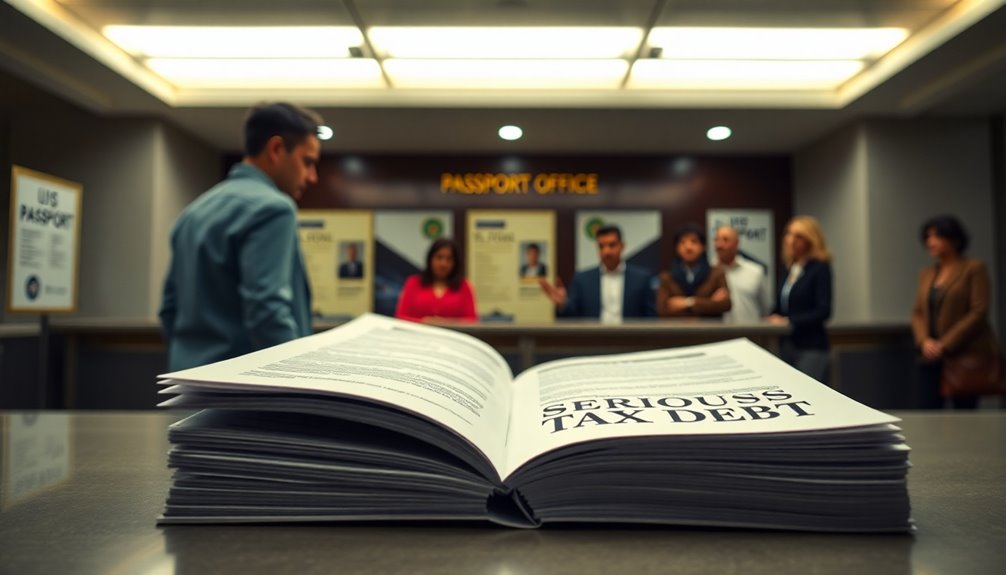You can't get a passport if you owe serious tax debt exceeding $50,000. The IRS will notify the State Department, which may deny your application or revoke your existing passport after a 90-day notice. Serious tax debts include unpaid taxes, penalties, and interest. However, if you enter an installment agreement or fully pay off your debt, these restrictions can be lifted. Special circumstances, like economic hardship, may also apply. Staying informed about your tax obligations and any potential relief options can help you maintain your passport eligibility moving forward.
Key Takeaways
- Serious tax debt exceeding $50,000 can lead to passport application denial and revocation of existing passports.
- The IRS notifies the State Department, resulting in a 90-day hold on passport applications for debts over $50,000.
- Paying off tax debt or entering an installment agreement can lift passport restrictions and allow for eligibility.
- Special circumstances, like economic hardship or bankruptcy, may exempt you from passport restrictions due to tax debt.
- Consulting a tax professional can help clarify obligations and explore options to resolve tax debts affecting passport rights.
Definition of Serious Tax Debt

When it comes to serious tax debt, you're dealing with unpaid federal tax liabilities that can significantly impact your ability to obtain a passport.
To qualify as serious, your tax debt must exceed $50,000, which includes the unpaid taxes, penalties, and interest. This amount is adjusted annually for inflation, so it's crucial to stay informed about the current threshold. A federal tax lien must be filed under section 6323, and you must have exhausted your administrative rights under section 6320 or faced a levy under section 6331. These actions signal serious delinquency. However, not all tax debts fall into this category. For instance, if you're paying your tax debt under an installment agreement or an accepted offer in compromise, those debts aren't considered serious. Additionally, if you're awaiting a collection due process hearing or have requested innocent spouse relief, your debt may be excluded.
It's important to note that the IRS can certify seriously delinquent tax debt to the State Department, which may lead to passport issuance consequences.
Impact on Passport Applications

Serious tax debt can significantly affect your ability to apply for or renew a passport. If your tax debt is certified as seriously delinquent, the IRS notifies the State Department, which can deny your new passport application. They'll hold your application for 90 days, giving you time to resolve the debt with the IRS. If you can address the tax issue or enter a payment plan within that period, you may avoid denial.
The same rules apply to passport renewals. If you owe more than $59,000 in back taxes, penalties, and interest, your renewal application will also face a 90-day hold. Furthermore, it is important to note that the IRS must file a federal tax lien before notifying the State Department about your seriously delinquent tax debt. If you don't resolve the debt or establish a payment plan in that time, the State Department may deny your renewal.
Additionally, if your tax debt remains unresolved, the State Department can revoke your existing passport after the 90-day notice period. In some cases, they might issue a limited-use passport for your return to the U.S. However, you must resolve your tax debt to lift the revocation.
Understanding these impacts is crucial for maintaining your passport privileges.
Exceptions to Passport Restrictions

Several exceptions can help you navigate passport restrictions if you owe taxes. For instance, if you pay your tax debt in full, the IRS will reverse its certification, lifting any passport restrictions. Similarly, if you enter into an installment agreement—either full or partial—and make your first payment, you can also see those restrictions lifted.
If you prove economic hardship, the IRS might place your debt in Currently Not Collectible (CNC) status, which can also remove passport issues. It's important to note that seriously delinquent tax debt applies when your federal tax debt reaches $50,000 or more, including penalties and interest.
Special circumstances exist too. If you're in bankruptcy, have been a victim of tax-related identity theft, or live in a federally declared disaster area, the IRS won't certify your debt. Additionally, if you're serving in designated combat zones or have pending installment agreements or offers in compromise, certification is delayed or withheld.
If your debt is inaccurate or legally unenforceable, the IRS must reverse certification. If you receive a CP508C notice, you have 90 days to resolve the issue before your passport application gets denied.
IRS Notices and Communication

Understanding the IRS notices and communication regarding passport restrictions is vital for taxpayers facing tax debts. One key notice you might receive is the CP508C, which alerts you that your tax debt has been certified as seriously delinquent. This notice is sent to your last known address and informs you about the potential for passport denial or revocation, along with steps to resolve the issue.
Importantly, the IRS won't send a copy of this notice to your power of attorney, so be sure to keep track of it yourself. The CP508C also includes contact information for the IRS. If you disagree with the certification, you can call the numbers provided to discuss your situation. Additionally, you'll find an address to send proof of payment or any correspondence related to your tax debt.
It's crucial to act promptly upon receiving this notice. The IRS notifies the State Department about your seriously delinquent tax debt, which can lead to passport restrictions. If you have significant tax debts of $62,000 or more, you should take immediate steps to resolve your financial issues to avoid complications with your passport.
Resolution Options for Tax Debt

If you're facing tax debt, knowing your resolution options can make a significant difference in regaining your passport rights. The most straightforward approach is paying off the debt in full. Once you do, the IRS will reverse the certification with the State Department within 30 days, allowing you to recover your passport without any additional penalties.
If immediate payment isn't feasible, consider establishing an installment agreement. This allows you to pay off the debt over time, and the IRS will lift passport restrictions once the agreement is active and the first payment is made. IRS notification can also be triggered if you enter an agreement, which helps protect your passport privileges.
Another option is submitting an Offer in Compromise, where you propose settling your tax debt for less than the total amount owed. If the IRS accepts your offer, it can also reverse the certification.
Lastly, if you're experiencing extreme financial hardship, applying for Currently Not Collectible (CNC) status might be the right choice. This status halts collection actions, including passport revocation, although it doesn't eliminate the debt.
Choosing the right resolution path can help you regain your passport rights while addressing your tax obligations.
Additional Requirements for Passport Eligibility

Regaining your passport rights is just one part of the picture; there are additional requirements for passport eligibility that you need to consider.
First, you must be a U.S. citizen by birth or naturalization, or a qualifying U.S. non-citizen national. When applying, you'll need to present proof of U.S. citizenship, such as a birth certificate or Certificate of Naturalization, along with a photo ID like a driver's license or military ID. It's essential to remember that seriously delinquent tax debt can impede your ability to obtain a passport.
Don't forget to bring photocopies of these documents and a passport photo.
The application process requires you to apply in person at a passport acceptance facility—no online or mail applications are accepted. You'll need to fill out Form DS-11, which you can complete online and print or obtain at the facility.
Importantly, you can't sign the application until the acceptance official instructs you to do so.
If you've got dual citizenship, remember that you may need to use both U.S. and foreign passports for travel. Additionally, be aware that criminal convictions or outstanding warrants can also affect your eligibility for a passport.
Tax Compliance Essentials

Tax compliance is crucial for anyone looking to secure or maintain their passport rights. If your tax debt exceeds $50,000, including interest and penalties, you may face serious consequences. The IRS must certify your debt as "seriously delinquent" to the State Department, which can lead to passport denial or revocation. You'll receive a CP508C notice informing you that your tax issues have been reported, triggering a 90-day notice period before any passport actions are taken.
To avoid passport restrictions, you need to resolve your tax debt. This means filing all necessary tax returns for the past six years and ensuring your withholding taxes are up to date. Furthermore, failure to resolve serious tax liabilities, including payroll tax liabilities, can lead to increased urgency for resolution and potential passport restrictions.
If you're an independent contractor or business owner, make sure you're making quarterly tax payments. Options like installment agreements or Offers in Compromise can help you settle your tax liabilities and restore your passport rights.
Special Circumstances Affecting Passports

Special circumstances can significantly impact your passport eligibility, especially when you're dealing with tax issues. If your total tax debt exceeds $59,000 and the IRS has filed a notice of federal tax lien, you could face serious restrictions. Additionally, if a Collection Due Process hearing was held and you missed the deadline, or if a levy has been issued against you, your passport application might be denied or revoked. However, there are exemptions and relief options available. If you're making payments through an approved installment agreement, your eligibility may remain intact. Innocent spouse relief can also protect you if your spouse is solely responsible for the tax debt. Furthermore, timely requesting a Collection Due Process hearing or pursuing an Offer in Compromise can help avoid passport issues. It's important to note that the IRS can notify the Department of State about seriously delinquent tax debts, which could further affect your passport status.
If you're proactive about resolving your tax debt, you can restore your passport eligibility. Paying off the debt or demonstrating a good-faith effort to do so can prevent IRS certification to the State Department. Consulting a tax professional can also guide you through maintaining your passport eligibility while addressing your tax obligations.
Frequently Asked Questions
Can I Travel Outside the U.S. if I Owe Taxes?
If you owe taxes, traveling outside the U.S. might be complicated.
You could face passport restrictions due to seriously delinquent tax debt, which means more than $51,000 in back taxes. Without resolving this debt, you won't be able to obtain or renew your passport.
To avoid travel disruptions, consider paying your taxes in full or setting up a payment plan with the IRS.
Addressing your tax situation is essential for hassle-free travel.
How Long Does a Passport Revocation Last?
A passport revocation lasts until you resolve your tax debt.
There's no specific timeframe; it depends on when you settle your obligations.
During this period, the IRS monitors your status, and if you don't comply with agreements, they can reinstate restrictions.
However, if you set up a payment plan or pay your balance in full, you can lift the revocation.
Once the IRS certifies your debt is resolved, your passport privileges resume.
Will My Passport Be Revoked if I Filed for Bankruptcy?
If you've filed for bankruptcy, your passport won't be revoked.
The IRS won't pursue revocation while your bankruptcy proceedings are ongoing, and they'll notify the State Department of your status. This means you can travel without worry during this time.
Just keep in mind that once your bankruptcy is resolved, it's important to address any remaining tax issues to avoid future complications with your passport.
Can I Appeal a Passport Denial Due to Tax Debt?
Yes, you can appeal a passport denial due to tax debt.
You'll need to act quickly, especially within the 90-day window. Gather evidence supporting your case, like proof of payment or an installment agreement.
If you've been incorrectly certified, address that too. Consider requesting an expedited reversal if your travel plans are imminent.
Seeking help from a tax professional can also guide you through the appeal process effectively.
What Happens if My Tax Debt Is Resolved After Passport Denial?
Once your tax debt's resolved after a passport denial, you can regain your passport eligibility.
The IRS notifies the State Department to lift the certification within 30 days of your payment.
If you set up a payment plan, your passport holds are also released after the first installment.
Make sure to confirm with both the IRS and State Department to ensure everything's updated, so you can travel freely again.
Conclusion
In summary, owing serious tax debt can affect your ability to get a passport, but there are exceptions and ways to resolve your tax issues. If you find yourself in this situation, it's crucial to communicate with the IRS and explore your options. Staying compliant with tax regulations is key to maintaining your passport eligibility. Don't let tax debt hold you back—take action now to clear your obligations and secure your travel plans!









